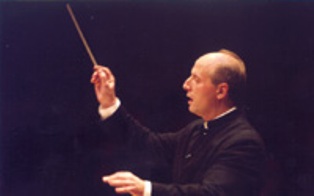
Stravinsky Behind the Mask
Paavo Järvi

Igor Stravinsky lied. Or he had yet to meet Paavo Järvi and
the Cincinnati Symphony Orchestra.
Famously known for
having declared that "music is by its very
nature, essentially powerless to express anything at
all," Stravinsky
used the mask of objectivity to craft his own powerful means
of
expression.
Järvi noted in a
"Classical Conversation" an hour before Friday
night's CSO concert at Music Hall that when it comes to
composers, "you
should never trust anything they write," then
demonstrated that with a
performance of Stravinsky's Symphony of Psalms with the CSO
and May
Festival Chorus that packed an expressive punch that may
have been
beyond words, but certainly not beyond music.
That expressivity
was fundamentally and profoundly religious. As
such it was well paired with another Stravinsky work, his
Chorale-Variations on "Vom Himmel hoch da komm' ich
her" ("From Heaven
High I Come to You") based on an organ work by J.S.
Bach. A CSO
premiere, it also resembled the Symphony of Psalms in its
unusual
instrumentation, both works utilizing reduced
"dark" string sections
and predominantly wind sonorities (just cellos and basses in
the
Symphony of Psalms, violas and basses in the
Chorale-Variations).
The chorus played a
cantus firmus role in the Chorale-Variations
until the end, where the men and women sang in a two-part
canon, the
men voicing the chorale upside down. The variations,
largely defined
by the instruments, were elaborate and delightfully
Stravinskyian, the
composer having slyly inserted occasional "wrong
notes."
The second half of
the program, which opens a two-week CSO
"Stravinsky Festival," consisted of Beethoven's
Symphony No. 3
("Eroica"). The choice was dictated, said Järvi,
by both composers
having been musical revolutionaries.
Prepared by May
Festival Chorus director Robert Porco, the chorus is
as finely tuned vocally as the CSO is instrumentally and
they made
perfect collaborators.
The three movement
Symphony of Psalms is a setting of verses from
Psalms 38 and 39 from the Latin Vulgate (39 and 40 in the
King James
version) and the complete Psalm 150. The Psalms answer each
other and
it could be clearly discerned in the music.
that was stark and imploring, with a hard, relentlessly
hammered
two-note motif. Psalm 39, "Expectans expectavi
Dominum et intendit
mihi" ("I waited patiently for the Lord and He
inclined unto me"), was
the answer, beginning with a softly uttered, forlorn fugue
rising to a
loud declamation on "Et immisit in os meum canticum
novum" ("And He
hath put a new song in my mouth").
Psalm 150,
"Alleluia. Laudate Dominum" ("Alleluia, Praise ye the
Lord") became that new song, unfolding in sublime
beauty
(thrice-repeated "Alleluias") with crisp accents
on "Laudate Dominum."
The concluding
"Laudate Eum in cymbalis benesonantibus" ("Praise Him
upon the loud cymbals") lacked cymbals, but offered a
vision of
eternity instead, with a rhythmic and harmonic ostinato of
ethereal
beauty.
Beethoven's
"Eroica" had the energy and transparency of a chamber
ensemble with the sheen of a full symphony orchestra. Järvi,
who just
won the German Record Critics Prize for his recording of the
"Eroica"
and Eighth Symphonies with the Deutsche Kammerphilharmonie
his individual stamp on it with the CSO, as well. The
first movement
was lyrical and dancelike (even waltz-like at times).
The Funeral
March was noble in its grief and the Scherzo dripped with
mirth. The
finale was as filled with character as a puppet theater,
with a
breathtaking pell mell conclusion.
Repeats are 8
tonight, 3 p.m. Sunday at Music Hall. Don't miss
Järvi’s
"Classical Conversation" with CSO assistant conductor Eric